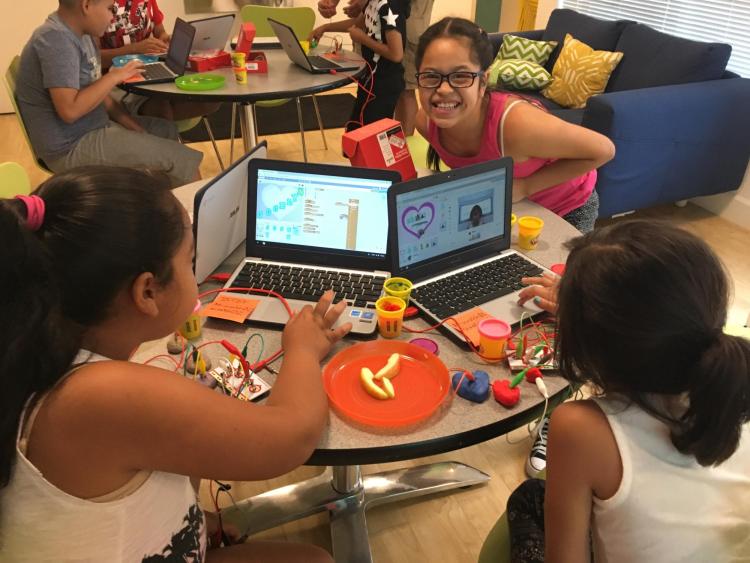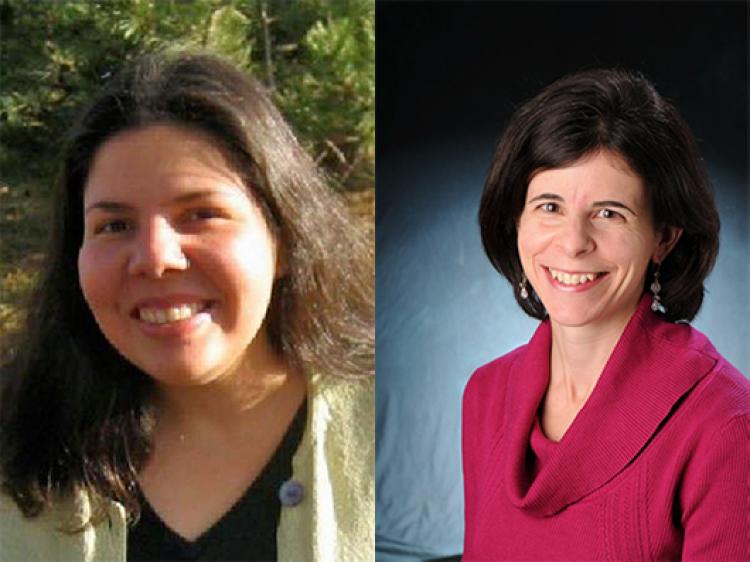Faculty team up to give kids computational competence
In 2015, Eliana Colunga and Stacey Forsyth launched a program—now called Communities Code—to bring computer-coding skills to underrepresented youth—particularly girls and minorities.
The initiative has garnered university outreach awards for the last four years, and its founders say the program boosts not only kids’ tech skills but also their self-esteem.

Girls share a moment of good cheer during a fall 2017 session of Communities Code, which aims to bring computer-coding skills to underrepresented youth, particularly girls and minorities. Photo courtesy of Eliana Colunga
“The ability to create and express oneself with technology is important for full participation in today’s digital society,” they write on the University of Colorado Boulder Public Outreach and Community Engagement website. “However, troubling participation gaps still persist among underrepresented groups such as African-American and Latino-American youth.”
During its first year, there was no shortage of takers. Working with two elementary schools, a middle school and public libraries in Boulder County, they had no trouble filling their semester-long after-school classes.
The problem was, they were coding to the choir, so to speak. Most of the kids who showed up at one-time weekend workshops were boys, more than half of whom had parents who were software engineers. Even when the workshop was limited to girls, there was an overrepresentation of those whose parents were programmers.
“As long as it was an opt-in situation, we were getting the same people who were already interested and knew how to code,” says Colunga, associate professor of psychology and neuroscience at the University of Colorado Boulder. “That’s not exactly what we were after.”

Eliana Colunga and Stacey Forsyth
So, for the second year of Communities Code, Colunga and Forsythe, director of CU Science Discovery, shifted gears. They partnered with the city of Boulder Housing Partners, which builds, owns and manages affordable housing for low- and moderate-income residents and began doing professional development with teachers.
“So, rather than have (students) sign up, we helped teachers incorporate tools into the classroom so more children were exposed to them,” Colunga says.
Three years ago, Communities Code started a tech club for girls and their mothers and brought in Assistant Professor of Information Science Ricarose Roque to bring workshops to the families of students and began working with local kindergarteners in conjunction with the Boulder Public Library, the housing program and the city’s open-space department. The program has also expanded beyond just coding classes and workshops, incorporating everything from robotics to digital literacy for adults.
That kind of continuing innovation has earned the program CU Outreach Awards four years running.
For Colunga—who began coding in the late 1970s at age 7 “when the computer took up a whole room and it took another room just to cool it”—exposing underrepresented children to computers and technology is not merely a vocational pursuit.
“It’s not just a skill so, ‘Oh, now they can get a job.’ It’s a way of thinking, a way of approaching challenges, approaching the relationship with computers and tools in general as a designer and a creator,” she says.
It’s not just a skill so, ‘Oh, now they can get a job.’ It’s a way of thinking, a way of approaching challenges, approaching the relationship with computers and tools in general as a designer and a creator.'"
Students become comfortable with abstraction, problem-solving and iterative design—the ongoing process of designing prototypes, testing, analyzing and refining technology—in ways that will help them succeed whether they pursue a career in technology or not, Colunga says.
“All these things apply beyond computer science,” she says. “If you are writing an essay, you have to iterate, draft and edit, and you edit and edit and edit. It’s exactly the same thing, so it’s a really nice creative vehicle to learn about all these kinds of things.”
In addition, learning coding and other computer skills can have a positive effect on not just how the students see themselves, but how others see them, Colunga says. She cites the recent example of a group of second graders who were English-language learners.
“When they got back to their classrooms, they could sort of show off and teach the other kids. They are now the ones who can do this stuff,” she says. “It becomes part of their identity: This is what I can do; I can create with technology.”
One group of first graders at Boulder’s Crestview Elementary School spent the fall semester writing code to illustrate science concepts, such as animals and their habitats. An ongoing project for the class consists of coding simulations of bees pollinating plants that have been exposed to pesticides, allowing students to manipulate different parameters to observe what the consequences will be.
“I’m blown away by these kids,” Colunga says. “The stuff they are doing is just beyond amazing.”
The team also recently launched a research component of Communities Code, which will measure computational thinking skills among fourth graders before and after they participate in a semester of the program.

